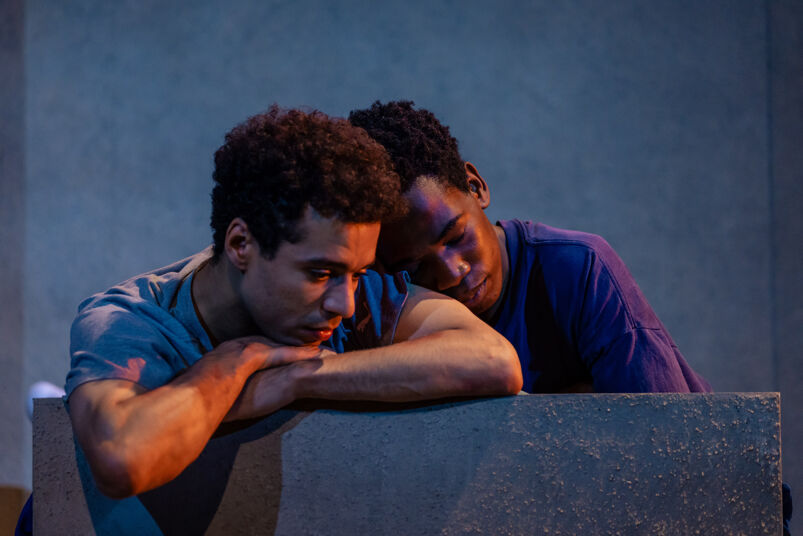
The Rundown
Beautiful Thing, by British writer Jonathan Harvey, remains one of the best-loved gay love stories to emerge from the 1990s. When it first premiered at the relatively small Bush Theatre in London in 1993, it proved a sensation. Theatrical gay characters before this were often coded or sidelined. When they did take center stage, the angst-ridden protagonists often led secret, depressing lives.
Sure, The Boys In The Band may have been groundbreaking for its time, but who would want to be a guest at that particular party? The arrival of AIDS in the 1980s did nothing to lighten the mood.
Related:
Fear and loathing in NYC: 25 fabulous facts about ‘The Boys In The Band’
Romances, reservations, and more juicy behind-the-scenes details you might not know about ‘The Boys In The Band.’
By contrast, Beautiful Thing focuses on two working-class teenage boys on a south London council estate who tentatively fall in love during a summer heatwave. Yes, they struggle with their feelings and live in fear of being called “queer”. Domestic confrontations also loom large in their lives. However, Harvey adds dollops of savage humor and acerbic wit to balance out the play’s darker edges.
Thirty years before the arrival of Netflix’s Heartstopper, it’s also unexpectedly upbeat and optimistic. It’s little wonder audiences flocked to see it.
A West End transfer followed, and then a movie version in 1996. There have been revivals since. This new production at the Royal Theatre Stratford East marks the play’s 30th anniversary.
Offering a fresh perspective, director Anthony Simpson-Pike has cast Black actors in the lead roles, commenting, “Beautiful Thing is an iconic queer story that holds a special place in so many people’s hearts. Many people saw their own stories on stage and screen for the first time. In its 30th anniversary year, I feel excited for people who look like me to see their own stories reflected on stage, too, to feel that same stirring of recognition in this seminal piece.”
No Tea, No Shade
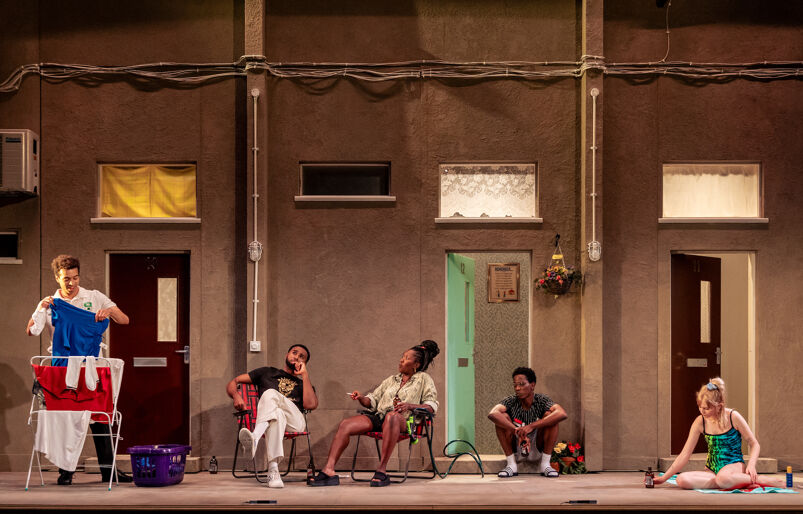
Fifteen-year-old Jamie (Rilwan Abiola Owokoniran) lives with his mom, Sandra (Shvorne Marks). Jamie is friends with 16-year-old neighbors Leah (Scarlett Rayner) and Ste (Joshua Asaré). Tony is a 27-year-old painter and decorator dating Sandra and is the closest thing Jamie has to a father figure.
Ste is a budding soccer player. However, that’s when he’s not hiding the bruises his ever-drinking father imparts on him. To escape his old man’s beatings, Sandra allows Ste to sleep over with Jamie. Her son hates sports and prefers The Sound of Music, but — sharing a single bed — the two boys soon find they have other interests in common.
Sandra (an excellent turn by Marks) is a domineering single mom. She berates Jamie for avoiding sports lessons, blasts Leah as a “slag” best avoided by all, and keeps a wary eye out for Ste’s welfare. She gives the weed-puffing Tony a hard time because life has taught her that men are unreliable. Her reaction to finding out her son is gay is the climax the play hurtles towards, soundtracked by a nostalgic catalog of songs by the Mamas & Papas.
This production has not been without some drama of its own. A couple of days before the scheduled press night, producers announced the actor originally cast to play Jamie had been forced to drop out for personal reasons. A replacement, Owokoniran, stepped up to the challenge of taking on the role at short notice.
The original press night was postponed to allow the actor time to make the role his own. This he does admirably, even if he and Asaré aren’t quite convincing as teenagers. But that’s a minor quibble. It remains refreshing to see the play shining a spotlight on young Black queer lives.
Let’s Have a Moment
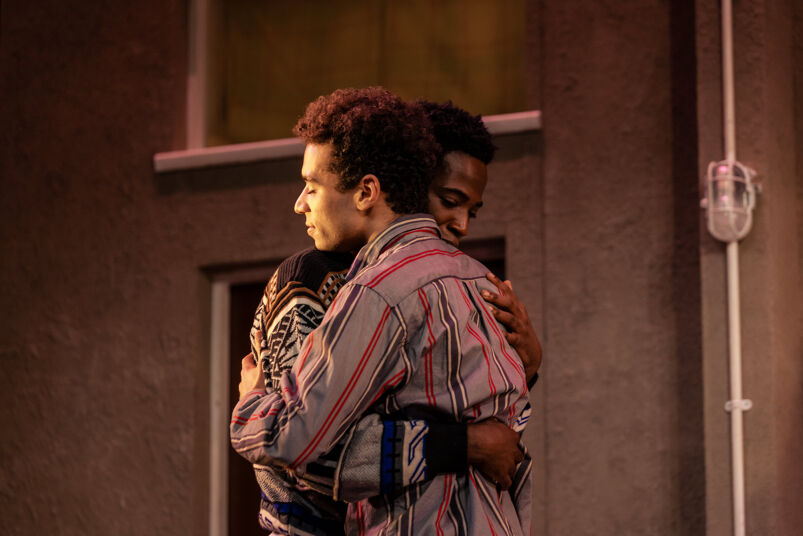
Harvey’s script doesn’t appear to have been updated in any way. Some references, like the ’80s TV police drama Cagney & Lacey (co-starring Tyne Daly, who returns to Broadway this winter in a revival of Doubt) and ’90s British soccer players, date the piece. Most audiences won’t mind — times have changed, but the situation remains as believable as ever.
It’s the relationship between Sandra and Jamie that underpins the story. We never get to see Ste’s dad, even if he looms over the drama.
The bedroom scenes remain sweet and tender in their fumbling innocence. Jamie soothes Ste’s bruises with the aid of some Body Shop Peppermint Foot Lotion. It’s the sort of everyday detail that makes Harvey’s script so relatable.
Much of the play’s humor comes from the Mama Cass-obsessed Leah (Scarlett Rayner). Like all the characters, she simply wants her life to get better, throwing herself at men in a quest for love and matching Sandra’s barbed put-downs with her own.
Leah thinks the whole world hates her. “We despair of you. That’s different,” says Sandra toward the end, revealing how concern can quickly be confused for criticism.
The confusion between emotions weaves its way through the story. Why is something that feels natural supposed to be wrong? Why do we sometimes reject what’s good for us?
The Last Word
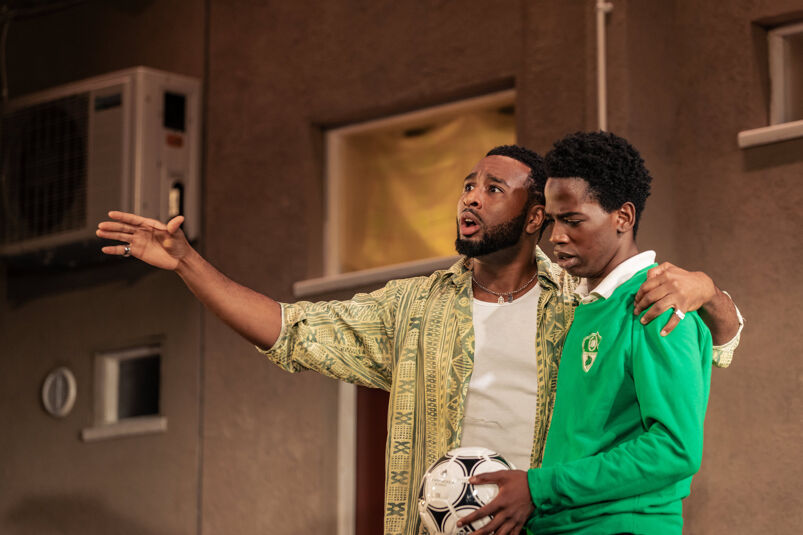
There’s so much queer content available to stream nowadays it’s hard to appreciate just how groundbreaking and much-needed Beautiful Thing was when it first arrived on stage, pre-dated by a handful of powerful queer playwrights, including Terrence McNally and Harvey Fierstein.
The decision to diversify the cast and emphasize the play’s relevance is not just a marketing ploy. It’s easy to forget that it remains hard for many to come out.
Disappointingly, the Saturday matinee show I attended had a few empty rows in the auditorium. That’s a crying shame. Whether you’ve seen this before or not, if you’re in the UK, I’d urge you to go and enjoy this queer classic all over again.
Beautiful Thing plays at Stratford East until October 7. It will then run at Leeds Playhouse from October 18-28, and HOME Manchester from October 31-November 11.
Related:
A lackluster script shortchanges Bryan Batt & company in ‘Pay the Writer’
‘Desperate Housewives’ and ‘Melrose Place ‘alum Marcia Cross co-stars in the new play by bestselling author Tawni O’Dell.


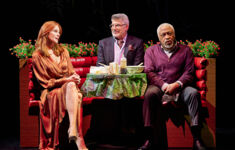




















Kangol2
I wish this new version was streaming and available in the US. Also with the new casting this iconic play sounds a lot like Rag Tag, the 2006 debut film by Adaora Nwandu, about two working class Black British gay teens, one Nigerian-British, the other Jamaican-British, who eventually reconnect in adulthood. Great film!
Sheppard87
Thanks for the recommendation, that sounds interesting.
Beanie16
WOW ..I love this story especially when I first saw it back in 96 when the MOVIE WAS RELEASED STARRING Glen Barry and Scott Neal…why was this left pit? Any writer that invested that much into an art had to have known about the movie, why did David Hudson leave it out of the article? Sounds like he didn’t want to for some personal reasons…now I’m not sure I’m interested in seeing this new version
Sheppard87
The writer did mention the movie, same way he mentioned the play transferred to the West End and had revivals, as back ground context. The article was about the new play, not the old movie. The movie was great, but that wasn’t the focus of the article so why waste space talking about it.
You are stretching to think the writer has some kind of personal vendetta against the movie. He just isn’t focused on it. Instead he wrote a perfectly serviceable review and informational piece about a queer play that people may be interested in. Why come to it with such negativity? You could have brought up the movie and your love of it without being a troll.
man5996853
Why create controversy where there is none? And, even if the writer was somehow biased against the film, why the F would you need to take it out on this new version, whose cast has absolutely nothing to do with this queerty writer. Take a xanax.
dbmcvey
Such a good movie!
London_Resistance2
” This he does admirably, even if he and Asaré aren’t quite convincing as teenagers.” – FFS !!!
How hard can it be to find teenage actors?
Answer: not hard at all!
They’re supposed to be teenagers, that is the point!
The film is great, btw
dbmcvey
There are issues when you have minors performing. There are rules pertaining to how much time they can spend in rehearsals and their education needs to be taken into account.
sfhairy
The movie is one of my top 5 films that I will watch yearly. I would love to see this version of the play or a netflix remake of the movie.
Fahd
Won´t be in England during those times, but I applaud the idea, and I hope they have full houses throughout the run.
KyleMichelSullivan
This sounds like a lovely version. Wish I could be in the UK, to see it.
Absolutely love the movie. Saw it when it first came out and have it on DVD.
Huron132
I remember a few years maybe before the movie I got to see the play. I just couldn’t get the story out of my head after seeing it. Then I gut to see the movie and was so happy to see the story again. I was so glad to see an actual happy ending to this subject. Many stories were foom and gloom by the end at the time. I got the VHS and the dvd. I probably watch this every year. The story is very important to me. Johnathan Harvey wrote a great story.
Glynn
London’s ‘Above the Stag’ Theatre staged a mixed race production in 2018 which was rather fab. The characters, Sandra and her son Jamie where played by black actors whilst Leah and her mum were white (as in the new Theatre Royal Stratford East version). All the teenage characters appeared to be cast age appropriate. Although the venue has now closed there are still quite a few articles and photos of the production online.
dbmcvey
I saw a really wonderful revival in London several years ago. A really wonderful play.